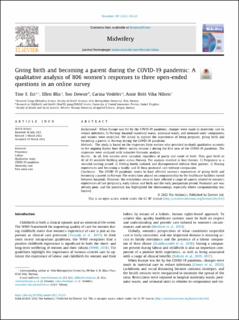| dc.contributor.author | Eri, Tine Schauer | |
| dc.contributor.author | Blix, Ellen | |
| dc.contributor.author | Downe, Soo | |
| dc.contributor.author | Vedeler, Carina | |
| dc.contributor.author | Nilsen, Anne Britt Vika | |
| dc.date.accessioned | 2022-03-28T07:17:54Z | |
| dc.date.available | 2022-03-28T07:17:54Z | |
| dc.date.created | 2022-03-27T09:18:35Z | |
| dc.date.issued | 2022 | |
| dc.identifier.citation | Eri, T. S., Blix, E., Downe, S., Vedeler, C., & Nilsen, A. B. V. (2022). Giving birth and becoming a parent during the COVID-19 pandemic: A qualitative analysis of 806 women's responses to three open-ended questions in an online survey. Midwifery, 109:103321. | en_US |
| dc.identifier.issn | 0266-6138 | |
| dc.identifier.uri | https://hdl.handle.net/11250/2987800 | |
| dc.description.abstract | Background
When Europe was hit by the COVID-19 pandemic, changes were made in maternity care to reduce infections. In Norway, hospital maternity wards, postnatal wards, and neonatal units’ companions and visitors were restricted. We aimed to explore the experiences of being pregnant, giving birth and becoming a parent in Norway during the COVID-19 pandemic.
Methods
The study is based on the responses from women who provided in-depth qualitative accounts to the ongoing Babies Born Better survey version 3 during the first year of the COVID-19 pandemic. The responses were analysed with inductive thematic analysis.
Results
In all, 806 women were included, regardless of parity and mode of birth. They gave birth in 42 of 45 available birthing units across Norway. The analysis resulted in four themes: 1) Pregnancy as a stressful waiting period; 2) Feeling lonely, isolated, and disempowered without their partner; 3) Sharing experiences and becoming a family; and 4) Busy postnatal care without compassion.
Conclusion
The COVID-19 pandemic seems to have affected women's experiences of giving birth and becoming a parent in Norway. The restrictions placed on companionship by the healthcare facilities varied between hospitals. However, the restrictions seem to have affected a range of aspects related to women's experiences of late pregnancy, early labour and birth and the early postpartum period. Postnatal care was already poor, and the pandemic has highlighted the shortcomings, especially where companionship was banned. | en_US |
| dc.language.iso | eng | en_US |
| dc.publisher | Elsevier | en_US |
| dc.rights | Navngivelse 4.0 Internasjonal | * |
| dc.rights.uri | http://creativecommons.org/licenses/by/4.0/deed.no | * |
| dc.title | Giving birth and becoming a parent during the COVID-19 pandemic: A qualitative analysis of 806 women's responses to three open-ended questions in an online survey | en_US |
| dc.type | Peer reviewed | en_US |
| dc.type | Journal article | en_US |
| dc.description.version | publishedVersion | en_US |
| dc.rights.holder | © 2022 The Author(s). | en_US |
| dc.source.volume | 109 | en_US |
| dc.source.journal | Midwifery | en_US |
| dc.identifier.doi | 10.1016/j.midw.2022.103321 | |
| dc.identifier.cristin | 2012757 | |
| dc.source.articlenumber | 103321 | en_US |
| cristin.ispublished | true | |
| cristin.fulltext | original | |
| cristin.qualitycode | 1 | |

